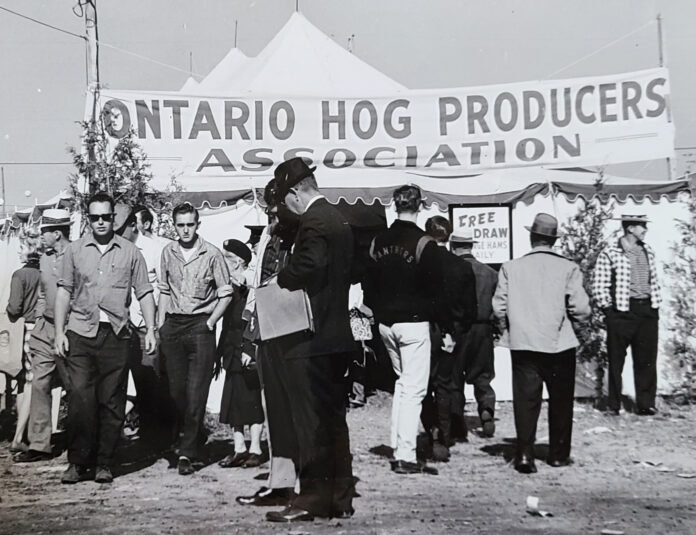By Stacey Ash
Editor’s note: Stacey Ash is Manager of Communications and Consumer Marketing at Ontario Pork. She can be contacted at stacey.ash@ontariopork.on.ca.

In 2021, Ontario Pork celebrates 75 years of serving and representing pork producers in the province. Celebrating such an important milestone has some challenges, with pandemic restrictions still limiting social gatherings, but the organization continues to mark the occasion in various ways, with plans for a more formal celebration when we can safely gather again.
A special anniversary section was incorporated into Ontario Pork’s Corporate Profile, including interviews with multi-generational farm families, insights provided by international workers growing their career in the Canadian pork industry and forward-looking insights from new members of the industry. A 75th-anniversary logo brings the celebration to Ontario Pork’s websites and producer-facing social media accounts.
Photos from the archives are being shared online at ontariopork.on.ca/history, as well as on social media, using the hashtag #OntarioPork75. Producers and industry partners are encouraged to join this trip down memory lane with contributions from their own photo albums or pork memorabilia collections.
There’s more to come, with planned contests, giveaways and celebrations in the months ahead.
Ontario Pork – looking back

On April 21, 1946, the offices of the Ontario Hog Producers’ Board opened in Toronto.
Farmers looked forward from the scarcity of the Second World War to a collaborative model where elected members would represent their best interests. Charles McInnis was a driving force behind the formation of the marketing board and served as president until 1961, alongside Norman McLeod, the board’s first chair.
At the time, close to 120,000 farms in Ontario reported having hogs, with an average of about 16 hogs per farm, and producers agreed to pay $0.02 per hog for the support of a central marketing organization.
It was not always easy. The 1950s saw the beginnings of central selling, first with United Livestock Sales, and later through the Ontario Hog Producers’ Cooperative, with 28 assembly yards operating across the province. The decade also saw escalating tensions between producers, processors and transporters, who did not all agree on the central approach to selling hogs.

The 1960s began with a swell of optimism around plans for the Farmers Allied Meat Enterprises (FAME) processing co-operative. At the Ontario Hog Marketing Board, advances were being made in hog selling. A new teletype machine at the head office listed lots of animals to be sold at assembly yards, and a new index grading system came into effect.
Efforts to promote pork to the public – and grow domestic sales – picked up steam in the 1970s, as the Ontario Hog Producers’ Marketing Board was renamed the Ontario Pork Producers’ Marketing Board. Ontario Pork opened two Toronto restaurants – ‘The Pork Place’ on King Street West, and the ‘Pork Pickins’ fast food outlet. The popular, and still quoted, ‘Put Pork on Your Fork’ campaign was in full swing by the end of the decade.
The 1980s were a time of political turmoil, as trade disputes with the U.S. saw heavy countervail duties imposed on fresh, frozen and chilled pork from Canada. Strong political advocacy on the provincial and national fronts helped see those duties eliminated in 1991. The focus at Ontario Pork turned to organizational review, beginning with the privatization of all Ontario Pork assembly yards. Debates and studies related to organizational review lasted well into the new millennium, leading to the end of single-desk selling in 2010.

Those years also saw significant change on the processing front, with Conestoga Meat Packers beginning operations near Breslau in 1982. In 1994, 120 farms came together to create Progressive Pork Producers: a farmer-led co-operative to run Conestoga Meats.
Swine research became a cornerstone of Ontario Pork’s mandate, with one project in particular garnering a great deal of attention in the early 2000s: Enviropig. Genetically engineered to reduce phosphate excretion, the pig developed at the University of Guelph showed great promise to address environmental concerns but ultimately could not overcome public distaste for genetic modifications.

In 2014, Ontario Pork helped the industry navigate two major crises: with the collapse of Quality Meats in Toronto, and export disruptions following the arrival of porcine epidemic diarrhea (PED) in Canada. Working with government, Ontario Pork secured funding to help restore consumer confidence and boost sales through the creation of a retail branding program.
Through massive demographic shifts, operational changes, political battles, trade issues, disease outbreaks and evolving public expectations, one thing has remained constant: Ontario Pork’s steadfast commitment to serving and supporting its members.
Ontario Pork today – and tomorrow

Today, 75 years after the organization first opened its doors, a global pandemic, which brought shortages and supply chain disruptions, appears to be nearing its end. Support from our provincial government partners is strong, including the creation of new legislation to better protect farms targeted by those who would seek to end the industry.
What do the next 75 years look like? Pork producers in Ontario have earned a reputation for resilience and perseverance. This comes from the hard work and commitment demonstrated by producers, Ontario Pork board members and staff, and industry stakeholders. Those up-and-coming in the industry are continuing their commitment to environmental stewardship, along with increased collaboration and partnership within industry and government to ensure the further growth of the sector for future generations, so that they can carry on the legacy of providing a high-quality product for consumers.
While the number of producers is only a fraction of what it was in the beginning, appetite for Ontario-raised pork now continues to grow at home and overseas, and Ontario Pork ensures the voice of producers is heard as loudly today as it was in 1946. Ontario Pork, and the producers it represents, can look forward with confidence to the next 75 years.





